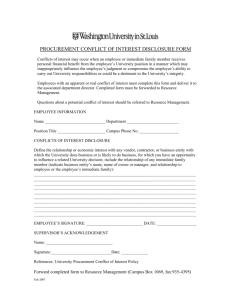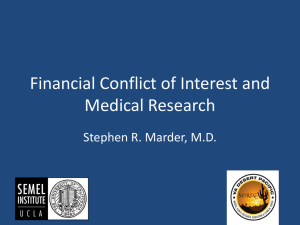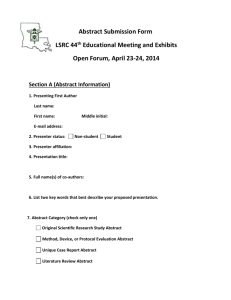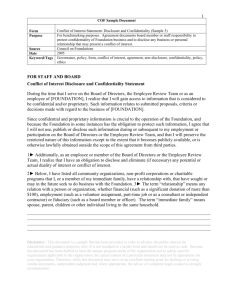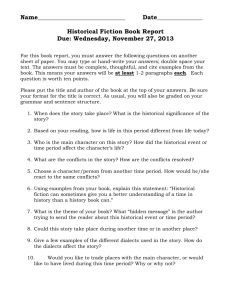Avoiding Conflicts of Interest
advertisement
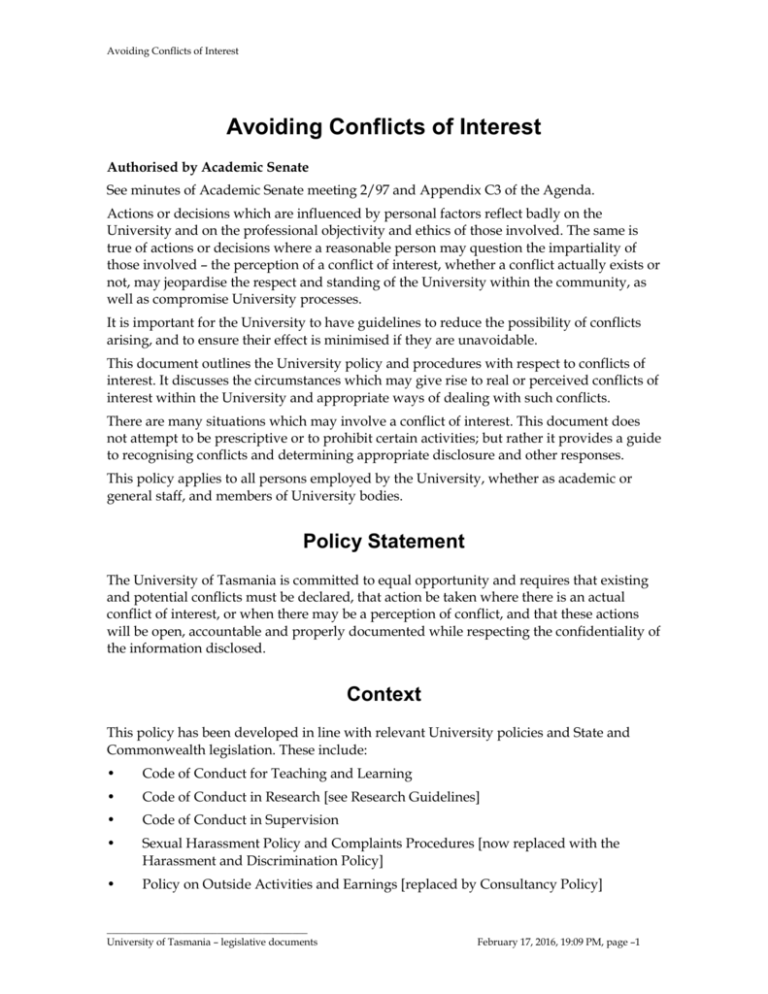
Avoiding Conflicts of Interest Avoiding Conflicts of Interest Authorised by Academic Senate See minutes of Academic Senate meeting 2/97 and Appendix C3 of the Agenda. Actions or decisions which are influenced by personal factors reflect badly on the University and on the professional objectivity and ethics of those involved. The same is true of actions or decisions where a reasonable person may question the impartiality of those involved – the perception of a conflict of interest, whether a conflict actually exists or not, may jeopardise the respect and standing of the University within the community, as well as compromise University processes. It is important for the University to have guidelines to reduce the possibility of conflicts arising, and to ensure their effect is minimised if they are unavoidable. This document outlines the University policy and procedures with respect to conflicts of interest. It discusses the circumstances which may give rise to real or perceived conflicts of interest within the University and appropriate ways of dealing with such conflicts. There are many situations which may involve a conflict of interest. This document does not attempt to be prescriptive or to prohibit certain activities; but rather it provides a guide to recognising conflicts and determining appropriate disclosure and other responses. This policy applies to all persons employed by the University, whether as academic or general staff, and members of University bodies. Policy Statement The University of Tasmania is committed to equal opportunity and requires that existing and potential conflicts must be declared, that action be taken where there is an actual conflict of interest, or when there may be a perception of conflict, and that these actions will be open, accountable and properly documented while respecting the confidentiality of the information disclosed. Context This policy has been developed in line with relevant University policies and State and Commonwealth legislation. These include: • Code of Conduct for Teaching and Learning • Code of Conduct in Research [see Research Guidelines] • Code of Conduct in Supervision • Sexual Harassment Policy and Complaints Procedures [now replaced with the Harassment and Discrimination Policy] • Policy on Outside Activities and Earnings [replaced by Consultancy Policy] ________________________________________ University of Tasmania – legislative documents February 17, 2016, 19:09 PM, page –1 Avoiding Conflicts of Interest • Equal Employment Opportunity Policy and • Human Rights and Equal Opportunity Commission Act 1986 (Cwlth) • Disability Discrimination Act 1992 (Cwlth) • Racial Discrimination Act 1978 (Cwlth) • Sex Discrimination Act 1984 (Cwlth) • Sex Discrimination Act 1994 (Tas) Definition A conflict of interest exists where there is a divergence between the individual interests of a person and their professional obligation to the University such that an independent observer might reasonably question whether the professional actions or decisions of that person are influenced by their own interests. Discussion University staff owe a professional allegiance to the University and should not allow other interests to conflict with their responsibilities to the University. A conflict of interest depends on the situation, and not on the character and actions of an individual. The issue is whether an independent observer may reasonably question the factors that affected a decision or action, and not whether they have in fact affected the decision or action. The policy focus, therefore, is whether the particular interests or circumstances of the staff member are likely to compromise, or be perceived as compromising, the staff member’s ability to carry out their duties impartially. A bias against a person has the same potential to give rise to a conflict of interest as a bias in favour of a person. Types of interests which might give rise to a situation of conflict include: • a direct or indirect financial interest of an employee, such as a business involvement with a company which has a contractual arrangement with the University; • a non-pecuniary interest of an employee, such as a family relationship or other personal or emotional relationship (including friendships and antagonisms). Personal relationships between staff and students have significant potential for creating situations involving conflicts of interest; • another affiliation of an employee, such as to another employer or some other association. Examples While a conflict of interest may arise in any situation, examples include: ________________________________________ University of Tasmania – legislative documents February 17, 2016, 19:09 PM, page –2 Avoiding Conflicts of Interest • employment issues, such as selection and promotion committees, confirmation of appointments, performance reviews and staff development; • student issues, such as selection of students for admission, assessment processes, and allocation of scholarships and other awards; • funding issues, such as involvement on a grants selection panel; • staff acting for the University on boards, trusts and other committees; • staff being a director of a company or a principal of a partnership; • staff participating in contracts or agreements with or on behalf of the University; and • staff participating in outside earning activities. General procedures Obligations of Staff At all times staff should be sensitive to the potential for conflicts of interest. Every effort must be made to ensure that individual interests do not conflict, or appear to conflict, with the interests of the University. Frequently the person who knows most about a potential conflict of interest is the individual concerned. Therefore that person has a responsibility to ensure, wherever possible, that no real or perceivable conflict arises in the performance of their University duties. If an individual is aware of an interest that might reasonably be seen to conflict with their duties in the University, they have an obligation to disclose that conflict. Situations may arise that are not clear cut and staff may be in genuine doubt as to whether a conflict of interest should be declared. In such cases staff should err on the side of caution and discuss the situation with an appropriate person, such as a person with responsibility for the issue or area. There may be situations where an individual is unwilling to disclose the details giving rise to the conflict of interest. In such cases it is sufficient to disclose the fact of the conflict, as long as they withdraw from the situation concerned. Disclosure Notification of an actual or potential conflict of interest should be made to a person with responsibility for the issue or area, such as the relevant committee chair, project leader, supervisor, head of department or section, head of school or division, or the ViceChancellor. Staff who fail to disclose a potential or actual conflict of interest in accordance with this policy may be liable to disciplinary procedures as governed by relevant industrial awards or agreements. Information from Third Parties ________________________________________ University of Tasmania – legislative documents February 17, 2016, 19:09 PM, page –3 Avoiding Conflicts of Interest A third party may raise concern about a possible conflict of interest, if there are reasonable and substantial grounds that such a conflict exists. A third party in this context may be a person directly affected by the actual or potential conflict (eg a competing application), or a student or employee of the University who genuinely believes that the interests of the University or affected parties have been, or will be, materially damages by the conflict of interest. The serious nature of third party disclosures must be emphasised to avoid frivolous or mischievous allegations. Notification by a third party should be made to a person with responsibility for the issue or area, as outlined above. The person notified has the option to dismiss the complaint if they consider it is mischievous or frivolous. If action is taken on the complaint, as outlined below, the individuals allegedly involved must be informed to allow them to rebut the complaint. Action following a Disclosure The response to a disclosure of a conflict of interest should be appropriate to the circumstances. A general principle is that the disclosure of any actual or potential conflict should be treated with sensitivity, common sense, and in a manner that ensures just and open processes which are properly documented. Any person receiving a notification should acknowledge receipt of the disclosure in writing. Appropriate action may include: • giving advice on the appropriate action so as to avoid, resolve or minimise the effect of the conflict, which might range from withdrawal from the issue to taking no further action beyond recording the disclosure; • referring the issue to an appropriate person for advice or action. If the individual making the disclosure is unwilling to explain the nature of the conflict, they should immediately withdraw from the situation concerned. Where it becomes apparent that an action or decision has been taken that was affected, or may be perceived to have been affected, by a conflict of interest, the action or decision should be reviewed. Confidentiality Disclosures regarding a conflict of interest may include personal, sensitive or otherwise confidential information. Therefore disclosures must at all times be treated with discretion, and confidentiality should be respected where possible. In the exercise of this discretion it should be emphasised that a key aim of this policy is to avoid perceived conflicts of interest. Therefore, information should be publicly disclosed to the extent necessary to avoid such a perception arising. The collection and retention of personal information disclosed in accordance with this policy will follow information privacy principles. Specific procedures ________________________________________ University of Tasmania – legislative documents February 17, 2016, 19:09 PM, page –4 Avoiding Conflicts of Interest The following sections expand on the general procedures in specific cases. A key principle is that all processes should be open, accountable and properly documented. Positions Requiring Independence There are numerous circumstances within the University where staff are placed in positions requiring independence. In particular, it must be recognised that where close personal relationships exist between individuals, the individuals concerned are generally not regarded by others as being independent. In general, staff should not accept appointments to positions where the perception of independence is important and a relationship may affect this perception. An example is supervisory or managerial positions where relationships could affect the recruitment, promotion, transfer, employment conditions, performance reviews, dismissals and other management issues. Multiple Positions Staff may often perform other roles within the University which are in addition to the duties of their appointed position. Examples of such positions include union representative, sexual harassment contact officer or member of a committee. Such dual roles may sometimes come into conflict, or may result in a staff member feeling they are unable to fulfil the responsibilities of each role in its entirety. In such a situation staff should raise the concerns with their supervisor. Committees, Boards and Panels If a member of a committee has an interest such that a reasonable observer, knowing all the facts, could reasonably conclude that the interest could affect the decision or functioning of the committee, the member must disclose the interest. The following procedures should be followed: 1 Committees which deal with matters where conflicts of interest can arise must have a standing agenda item calling for declarations of potential conflicts of interest. This does not preclude the disclosure of an interest at any stage in proceedings. 2 If a declaration is made the committee must consider the relevant circumstances including the seriousness of the conflict, the risk of a perception that a conflict exists, the likelihood that decisions may be influenced, and the ability to obtain alternative suitable representation on the committee. 3 The response to a declaration may include to: • determine that the issue will not affect, or be perceived to affect, the functioning of the committee; • request the individual to take all reasonable steps to remove the conflict; • require the individual to withdraw from the meeting for those proceedings directly affected by the potential conflict; or ________________________________________ University of Tasmania – legislative documents February 17, 2016, 19:09 PM, page –5 Avoiding Conflicts of Interest • request that the individual resigns from the committee. 4 A member may be unwilling to discuss the details giving rise to conflict, and this should be respected. In such a case the committee should be informed that a conflict may exist and the member must stand down from the committee for any item that is affected by the decision. Alternatively, the member may choose to resign. 5 The minutes should record that a conflict of interest was disclosed and the name of the member making the disclosure. Normally there will be no requirement to record the details of the conflict. In all cases the response to a disclosure should be recorded, eg ‘Dr Person left the meeting for this item’. Research The University’s Code of Conduct in Research requires that researchers make full disclosure in writing of any actual or potential conflict of interest in research to the ProVice-Chancellor (Research) as soon as reasonably practicable after they become aware of it. In respect of grants and other research funding there is an obligation to disclose to the funding body any actual or potential conflicts of interest which might affect the research or investigations, influence publication, or otherwise affect the project. Likewise in respect of publications, conflicts of interest should be disclosed to publishers or editors and to the readers of the published work. Contracts and Agreements Staff have an obligation to disclose in writing a responsible person associated with the contract or agreement at any time that they are aware of a conflict of interest that does or could exist in respect of their involvement in the contract or agreement. If a staff member who is negotiating an agreement on behalf of the University has an interest such that it could appear to a reasonable observer that negotiations are biased, the staff member should disclose that interest. Staff may not authorise agreements (including ordering or paying for goods or services) with organisations which they have an interest in. In such cases, the staff member should disclose their interest to their supervisor and their supervisor shall be responsible for authorisation. Where appropriate, University contracts with external organisations should include a clause requiring the parties to the agreement to disclose any actual or potential conflicts of interest. Staff-Student Relationships The University’s policies and codes of conduct recognise a special responsibility to ensure a quality learning environment for all students. An essential requirement is that staff exhibit responsible and ethical practices in their relationships with students. It is important that staff avoid situations where relationships with students could influence, or ________________________________________ University of Tasmania – legislative documents February 17, 2016, 19:09 PM, page –6 Avoiding Conflicts of Interest be perceived to influence, academic or professional judgements. In this context relationships can include personal, romantic, sexual, family or financial relationships. Close personal relationships between staff and students raise serious issues of potential or actual conflict of interest, involving authority and power, trust and confidence, and equity. In particular, situations that can give rise to an abuse of trust or power must not occur. A breach of trust arises when the trust associated with a professional relationship is damaged through unprofessional actions. The development of friendships between staff and students is recognised as part of University life. However, it is the responsibility of staff members to act professionally at all times, acknowledging the policies and integrity of the University of Tasmania. Personal relationships between staff and students must be consistent with the University’s policies and codes of conduct. In particular, students who are made to feel that their academic progress depends upon consenting to a sexual relationship with a member of staff are in an intolerable situation, and the staff member involved is guilty of sexual harassment. Principles Staff whose duties place them in a position of responsibility and trust with students should base their conduct on the following principles: 1 Staff have a professional and ethical responsibility to protect the interests of students, to avoid conflicts of interest wherever possible, to respect the trust involved in the staff-student relationship, and to accept the constraints and obligations inherent in that responsibility. 2 A close personal relationship with a student may blur the boundaries of professional and personal life, leading others to perceive that a conflict of interest situation has arisen or may arise. 3 Existing relationships with family, friends or business associates may raise ethical and professional issues, including conflict of interest, when that relationship conflicts with the professional responsibilities. 4 Conflicts of interest within staff-student relationships can also affect fellow students and colleagues, as well as the learning and working environments. Procedures By virtue of their position of authority, staff have the primary responsibility to disclose relationships that present an actual or perceived conflict of interest. In the case where a student is expected to undertake work or study in an organisation outside the University as part of the requirements for the course, the student has the responsibility to disclose any conflict of interest. In such cases the University will take every reasonable effort to avoid arrangements which give rise to conflict. When a conflict of interest in a staff-student relationship is disclosed the following procedures should be followed: ________________________________________ University of Tasmania – legislative documents February 17, 2016, 19:09 PM, page –7 Avoiding Conflicts of Interest 1 The head of departmentÊ[ie head of school], executive deanÊ[ie dean] or other appropriate officer should discuss the matter with the employee and the student. 2 An appropriate resolution to the issue, made in the best interests of the student, should be negotiated by the parties and requires the formal approval of the head of department, executive dean or appropriate officer before implementation. 3 The fact of disclosure and any alterations to procedures should be recorded (confidentially) in writing by the head of department, executive dean or other appropriate officer, with a copy given to the student and staff member. Options for resolution of the matter include, but are not limited to: • The parties may agree that the relationship will not affect the employee’s professional responsibilities and therefore no further action is taken. • The parties may determine that the staff member should not take any part in the academic progress or assessment of that student. • The head of department, executive dean or other appropriate officer may facilitate the reorganisation of the staff member’s professional duties in order to avoid or minimise professional contact with the student concerned. • If it is not appropriate or practicable to avoid contact completely, variations to normal procedures may be negotiated, such as requiring that another staff member be involved in all assessment of the student by the employee. In the case of the supervision of a postgraduate student, a co-supervisor may be appointed for coursework students and an alternative supervisor may be appointed for research students. Disclosure Of Other Employment Whilst in specific cases there may be obvious benefits to both staff and the University for staff to hold other employment in conjunction with their University employment, there also exists a potential for a perceived or real conflict of interest where more than one employment relationship exists at the same time. It is therefore important that staff disclose their intention to hold other employment concurrently with their University employment and that the University formally approves such arrangements in advance. Letters of appointment should provide for such disclosure and University approval, and all current staff will be asked to seek formal approval to hold other employment concurrently with their University employment. Disclosure and University approval documentation will be held in Personnel ServicesÊ[now known as Human Resources on the staff member’s personnel file. Outside Activities or Earnings Staff owe a professional responsibility to the University and must not allow other professional activities to detract from their obligations to the University. ________________________________________ University of Tasmania – legislative documents February 17, 2016, 19:09 PM, page –8 Avoiding Conflicts of Interest In undertaking any outside activities or earnings, academic staff must abide by the University’s Policy on Outside Activities and Earning of Academic Staff [replaced by Consultancy Policy]. Where a member of general staff is engaged in outside earning activities they must advise their supervisor or other appropriate person of any potential conflict of interest which may exist, or may be perceived to exist, with their obligations to the University under their contract of employment. Examples of potential conflicts include: • having a significant financial interest (including that of immediate family) in an organisation with which the University is involved, or is considering involvement, in respect of gifts, grants, agreements, sponsoring, and licensing; • providing advice to students, other staff or the University which is not independent of personal commercial and other interests; • otherwise allowing outside considerations to affect actions or decisions that are part of their responsibilities to the University. Particular issues can arise when employees are also directors of companies or involved in partnerships since, under Australian Corporations Law, a company director is required to act in the best interests of the company. A conflict may exist if such actions are contrary to the interests of the University. For this reason the University requires that all such appointments be declared to the ViceChancellor (see the Policy on Outside Activities and Earning of Academic Staff), and steps should be taken to resolve any conflict. Such steps may actually require resignation from the University or company. The staff member should also make an appropriate disclosure to the partnership or company in accordance with its Articles of Association and the Australian Corporations Law. Personal Beliefs It is unlawful to discriminate on the grounds of religious or political conviction. All staff have the right to their own beliefs and should respect the rights of others. However, staff should take care to ensure that their political involvement or religious and other personal beliefs do not bring them into conflict with their duties as a staff member of the University. It is recognised that a conflict of interest may arise when staff are required to implement a University policy which is at variance with the strong personal values of the individual. Acceptance of Gifts and Benefits No staff member should accept a gift or benefit if it could be seen as intended or likely to affect that staff member’s performance of their duties. Gift and benefits may only be accepted if approved by the Vice-Chancellor and the recipient will not be, or be seen to be, compromised in the process. Written notice of such gifts will be made by the staff member to the Vice-Chancellor. In accepting or refusing gifts, staff should consider the cultural context in which the gift was offered and endeavour to avoid giving offence. ________________________________________ University of Tasmania – legislative documents February 17, 2016, 19:09 PM, page –9 Avoiding Conflicts of Interest Policy in practice The following examples illustrate some situations which could arise, and how they could be approached. (a) A member of the University is on a University committee that has been established to select the recipient of an award. The member’s brother is a candidate for the award. There is a perceived conflict of interest here even if the individual does not in fact allow the relationship to affect a decision. The member must notify the Committee or its Chair of the conflict as soon as it becomes apparent. The proper action will normally be for the member to resign from the Committee or to stand down until the matter giving rise to the conflict has been completed. If the member does not resign or stand down, the Committee must consider the response to the situation, at the very least requiring the member to withdraw for discussions involving that candidate. Unless the member resigns, the fact of the disclosure and the actions in response must be recorded in the minutes of the Committee. (b) A staff member is also a consultant to a company. Although not an active participant in the company, the individual is sometimes involved in company decisions and has a financial interest in the company. The individual is a member of a research unit that is negotiating a contract with the company. A conflict of interest exists if the individual is involved in the negotiations, or if it appears that the individual has knowledge as an employee of the University that could assist the company in its negotiations. Likewise the individual may also have a conflict of interest in the eyes of the company. The staff member must notify the Pro-Vice-Chancellor (Research) as soon as the conflict becomes apparent. The Pro-Vice-Chancellor (Research) should acknowledge the disclosure and take appropriate action, such as directing the person not to take part in negotiations. It may also be appropriate to inform the company of the conflict. (c) A lecturer forms a friendship with a student through the provision of advice and support over a number of years. This friendship then develops into a strong personal relationship. The teaching program of the department means that the lecturer is involved in the assessment of the student during the course and in the formal examination. Further, the student intends to apply for a postgraduate scholarship in the forthcoming round and the lecturer is an obvious choice as a referee. The staff member must advise their superior (head of department or, if the staff member is head, the executive dean) of the relationship and that a conflict exists. The superior must, if requested, keep the details of the disclosure confidential as far as is possible while resolving the conflict. The superior must negotiate appropriate arrangements to ensure that the student is not advantaged or disadvantaged by the relationship and that there can be no perception of conflict. This may involve a change in teaching responsibilities in the department or changes in assessment arrangements. At the very least another staff member must be involved in all assessments to the extent that everyone can be confident of proper objectivity. The new arrangements and the extent to which they ________________________________________ University of Tasmania – legislative documents February 17, 2016, 19:09 PM, page –10 Avoiding Conflicts of Interest are made known to the rest of the class must be such as to minimise the concern of other students and staff. The staff member should if possible decline to act as a referee for the student’s scholarship application, or should declare their relationship in a confidential letter with the reference. It must be accepted that even if the relationship ends, a perception of conflict may continue for some time, and so it may be necessary to take action to counteract this perception. (d) A staff member elected to the University Council is also a company director. A matter arises which must be discussed by Council and also by the company board of directors. A conflict of interest exists if there is a possibility that the interests of the company are not precisely aligned with the interests of the University, since the member is required by law to act in the interests of the company but as a member of Council to act in the interests of the University. The member must inform the Vice-Chancellor of the potential conflict. The ViceChancellor will acknowledge the declaration and refer the matter to the Chancellor for a decision on the appropriate action. Preamble/Covering Letter It is the responsibility of the University to communicate the contents of this policy to all staff, and to students and other clients of the University. This will be achieved by: • inclusion in the appropriate University policy manuals; • inclusion in staff induction and training programs; • annual inclusion of information in UniTas; • circulation to all heads of departments and administrative sections for distribution to all staff, and • circulation to relevant staff unions and student unions. Wide publicity, discussion and review of the content of this policy is intended so that members of the University community will understand the issue as one of professional conduct and not an invasion of privacy. ________________________________________ University of Tasmania – legislative documents February 17, 2016, 19:09 PM, page –11

